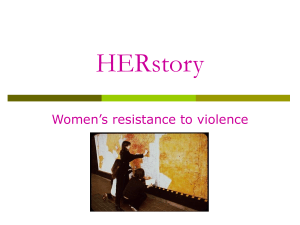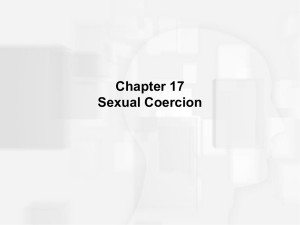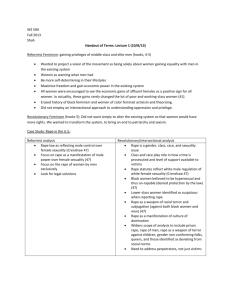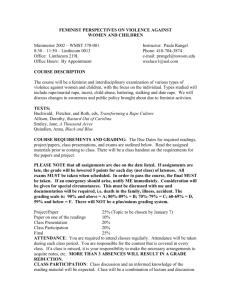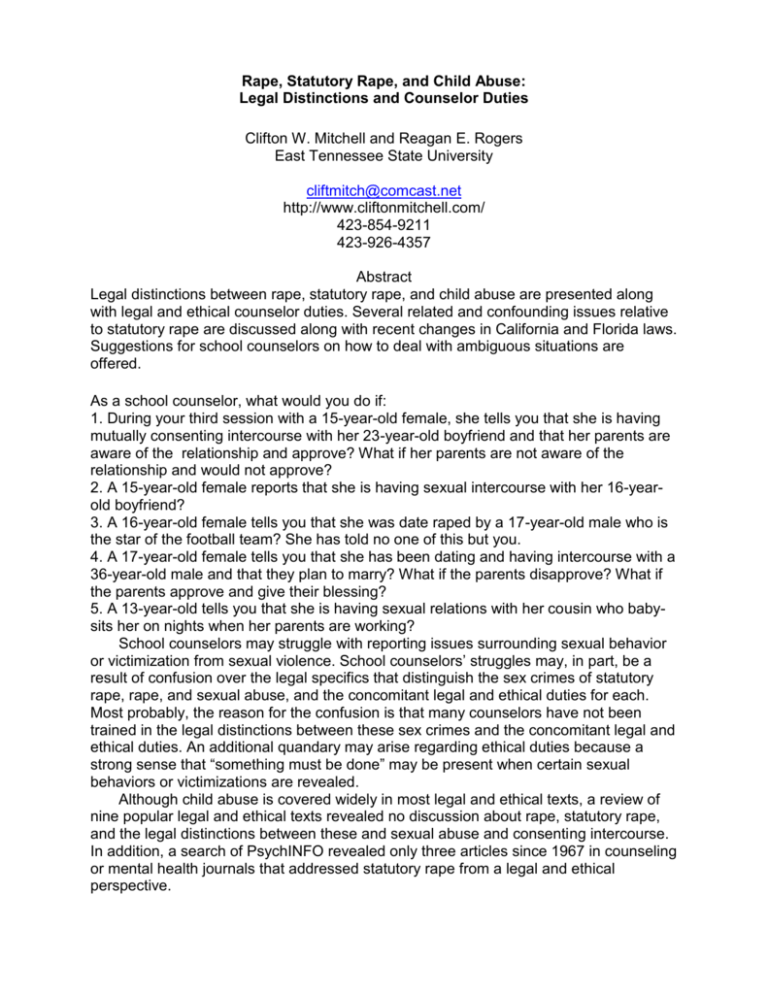
Rape, Statutory Rape, and Child Abuse:
Legal Distinctions and Counselor Duties
Clifton W. Mitchell and Reagan E. Rogers
East Tennessee State University
cliftmitch@comcast.net
http://www.cliftonmitchell.com/
423-854-9211
423-926-4357
Abstract
Legal distinctions between rape, statutory rape, and child abuse are presented along
with legal and ethical counselor duties. Several related and confounding issues relative
to statutory rape are discussed along with recent changes in California and Florida laws.
Suggestions for school counselors on how to deal with ambiguous situations are
offered.
As a school counselor, what would you do if:
1. During your third session with a 15-year-old female, she tells you that she is having
mutually consenting intercourse with her 23-year-old boyfriend and that her parents are
aware of the relationship and approve? What if her parents are not aware of the
relationship and would not approve?
2. A 15-year-old female reports that she is having sexual intercourse with her 16-yearold boyfriend?
3. A 16-year-old female tells you that she was date raped by a 17-year-old male who is
the star of the football team? She has told no one of this but you.
4. A 17-year-old female tells you that she has been dating and having intercourse with a
36-year-old male and that they plan to marry? What if the parents disapprove? What if
the parents approve and give their blessing?
5. A 13-year-old tells you that she is having sexual relations with her cousin who babysits her on nights when her parents are working?
School counselors may struggle with reporting issues surrounding sexual behavior
or victimization from sexual violence. School counselors’ struggles may, in part, be a
result of confusion over the legal specifics that distinguish the sex crimes of statutory
rape, rape, and sexual abuse, and the concomitant legal and ethical duties for each.
Most probably, the reason for the confusion is that many counselors have not been
trained in the legal distinctions between these sex crimes and the concomitant legal and
ethical duties. An additional quandary may arise regarding ethical duties because a
strong sense that “something must be done” may be present when certain sexual
behaviors or victimizations are revealed.
Although child abuse is covered widely in most legal and ethical texts, a review of
nine popular legal and ethical texts revealed no discussion about rape, statutory rape,
and the legal distinctions between these and sexual abuse and consenting intercourse.
In addition, a search of PsychINFO revealed only three articles since 1967 in counseling
or mental health journals that addressed statutory rape from a legal and ethical
perspective.
Recent findings indicating that significant numbers of teenage pregnancies were
fathered by men over four years older than their partners have led to increased
initiatives by the Federal Government toward enforcement of statutory rape laws by the
states (Donovan, 1997). These initiatives include mandated reporting of statutory rape
in some instances (Donovan, 1998). Concerns surrounding the implications of
mandated reporting of statutory rape have begun to emerge in the family planning
literature (Donovan, 1998; Miller, Miller, Kenney, & Tasheff, 1999). This trend is already
affecting school counselors in some states (Davis & Twombly, 2000; Safenetwork,
2002) and provides additional impetus for education regarding counselor duties with
regards to student sexual behavior and sex crimes.
The purpose of this article is to explain the legal distinctions between rape, statutory
rape, and child abuse, and school counselors’ obligations related to each. In addition,
complicating issues, such as cultural differences as well as the potential effect of
mandated reporting on counselors’ roles, are addressed.
Legal Distinctions and Duties
Child Sexual Abuse
Although child sexual abuse laws vary, states define sexual abuse from the
minimum definition standards created by the Child Abuse Prevention and Treatment Act
(CAPTA) (Jan. 1996 version). Under this law, a perpetrator of child sexual abuse is
defined as “…a parent or caretaker who is responsible for child’s welfare” and sexual
abuse is defined as:
The employment, use, persuasion, inducement, enticement, or coercion of any
child to engage in, or assist any other person to engage in, any sexually explicit
conduct or any simulation of such conduct for the purpose of producing any
visual depiction of such conduct; or the rape, and in the cases of caretaker or
other inter-familial relationships, statutory rape, molestation, prostitution, or other
form of sexual exploitation of children or incest with children.
The key element that distinguishes child sexual abuse from other sex crimes is that the
perpetrator is defined as being in a custodial or caretaker role (S. Cohen, National
Clearinghouse on Child Abuse and Neglect Information, personal communication,
March 27, 2002). Such roles are typically defined as a parent, relative, adult living in the
home, baby sitter, neighbor, teacher, faith community leader, and coach. Not included in
child abuse definitions are individuals whom one is dating or with whom one has a
romantic relationship. Such roles are not deemed as a custodial or caretaker by the law.
Further, under the law, one is prohibited from being in a romantic relationship if there is
a custodial duty. However, statutory rape and rape can occur in dating or romantic
relationships.
Rape and Statutory Rape
It is difficult to discuss rape and statutory rape laws without an explanation of the
differences between the two. Conceptually, rape laws are more similar between states
than statutory rape laws. Rape is generally defined as, “Unlawful sexual activity
(especially intercourse) with a person without consent and usually by force or threat of
injury” (Garner, 1999, p. 1267). Although it is recognized that definitions of rape include
sexual behavior other than intercourse, for brevity, this article will discuss rape in the
context of legally defined intercourse. Further, school counselors may deal with
students who are involved with or who have been victimized by someone of the same
sex. State laws may distinguish same sex (homosexual) intercourse from other sex
(heterosexual) intercourse. Acknowledging the inequity of this distinction, this article will
focus on laws that regard intercourse as some form of illegal sexual penetration.
Statutory rape laws are much more diverse and complex and, thus, are difficult to
discuss in general terms. There are two primary difficulties that arise when attempting to
discuss and explain statutory rape laws. The first difficulty results from the enormous
variance in how statutory rape is labeled from state to state. Although the term
“statutory rape” is commonly used, it is usually not the term used to describe the crime
in states’ legal statutes (Davis & Twombly, 2000). Examples of terms used to describe
statutory rape include: sexual assault, statutory sexual assault, unlawful sexual conduct,
gross sexual imposition, criminal sexual penetration, sexual contact, sexual offense,
and carnal knowledge (Donovan, 1997). In some states, Alaska for example, the
statutory rape is termed “sexual abuse,” thus, leading to possible confusion with sexual
abuse as defined by CAPTA noted above. To further complicate the legal definitions,
many states use the noted terms in conjunction with designations of degree of offense
(e.g., first degree, second degree). For example, New Mexico classifies levels of rape
and statutory rape by using terms such as first-degree criminal sexual penetration and
third-degree criminal sexual contact (Donovan, 1997). School counselors are strongly
advised to learn the legal terms for statutory rape in their state.
The second problem that arises in discussing statutory rape centers around the
enormous variance in how statutory rape is defined by various state laws. In general
terms, statutory rape is, “unlawful sexual intercourse with a person under the age of
consent…regardless of whether it is against the person’s will” (Garner, 1999, p. 1267).
Complicating this definition is the fact that the legal age of consent varies from state to
state depending on the age difference between the two partners. For the most part,
many states have an age level below which sexual intercourse is prohibited and
considered rape regardless of consent. This specified age is one that the state has
concluded that the child is not competent to make decisions regarding sexual behavior
with anyone, regardless of the partner’s age. States vary on the age of consent, but it is
usually between 14 and 16 years. States also have an age range somewhere between
this age level and late teens where intercourse is prohibited if one of the parties is older
by a specified number of years. This age difference is usually somewhere between 2 to
5 years. Intercourse between partners with these age discrepancies is defined as
statutory rape. Finally, there is an age level that, if both parties have reached or are
older, consenting sexual intercourse is legal; this age is usually 16 to 18 years.
Examples of the variations in laws can be seen in the laws of Tennessee and
Washington state. In Tennessee, intercourse with a child below age 13 is considered
rape (Rape of a Child, 1997). If the adolescent is between ages 13 to 17 and has nonforced intercourse with someone at least four years older, this is statutory rape
(Statutory Rape, 1994). Consenting intercourse is legal if both parties are 18 years or
older, or if one party is between 13 and 18 and the other party is not more than four
years older. In Kentucky, the charges are as follows: First degree felony for intercourse
with a minor under age 12; second degree felony is the minor is under 14 and the
partner is 18 or older, and third degree felony is the minor is under 16 and the partner is
at least 21 (Donovan, 1998). Although other state laws are similar conceptually, they
have comparable variations in definitions.
A discussion of perspectives will perhaps shed some light on the complexities of
statutory rape issues. From the perspective of adults, statutory rape may conjure up
ideas of an older person coercing a younger person into sexual behavior. However,
from the perspective of the parties involved, it is likely that the sexual relationship may
be viewed as either romantic or as a mutually consenting sexual encounter. Teenagers
may be unaware of the laws regarding statutory rape (Donovan, 1997). From a legal
perspective, statutory rape is defined as non-forced, sexual relations between partners
with specified age differences (Massachusetts Family Institute, 2000) A review of the
laws revealed that statutory rape definitions were based solely on age differences by 49
states. Only South Carolina appears to include issues of coercion, persuasion, and
enticement in its statutory rape definition (South Carolina, 2000). This stems from recent
amendments in the definition of sexual enticement of minors that have been legislated
in South Carolina in order to pursue predators on the internet or by phone or mail.
States originally created statutory rape laws in order to protect young females from
being preyed upon by adults because of an assumed developmental power differential
that may exist when there is a large age discrepancy between sexual partners
(Massachusetts Family Institute, 2000). Sexual intercourse by partners with certain age
differences is considered statutory rape because the law declares that the younger
party is incapable of consent by reason of age (Miller, et al., 1999). Thus, in most states
for example, a 16-year-old can legally consent to intercourse with a 17-year-old but not
with a 23-year-old. Although the right of legal consent is taken away for sexual relations
with partners with certain specified age differences, because statutory rape is nonforced, it is mutually consenting between partners (except, perhaps, as defined by
South Carolina law).
It is the mutually consenting component that distinguishes statutory rape from rape,
which includes force or threat of injury. In contrast to child sexual abuse, with statutory
rape the older party is not perceived as being in a custodial or caretaker role, and,
except in South Carolina, issues of coercion, persuasion, and enticement are not
considered as components of the definition.
Additional Complications
An understanding of the distinctions between rape, statutory rape, and child abuse
are further complicated by the degree of latitude provided prosecuting attorneys in
placing criminal charges against offenders. In placing charges, perpetrators may not be
charged, as might be presumed, based on their behavior (Plea Bargains, 2002). This is
because prosecuting attorneys may choose to charge a perpetrator based on a
negotiated guilty plea, not necessarily the specific actions of the perpetrator. Thus,
greater crimes may be plea-bargained down to lesser crimes in order to insure
convictions. Such legal maneuverings confuse the public as to what exactly constitutes
certain crimes, particularly when people are aware of the specifics of a case. When in
doubt, school counselors should consult with their local prosecuting attorney to gain
insight into sex crimes involving children. Such consultations should, of course, maintain
confidentiality. This can readily be accomplished by initially presenting cases as
hypothetical examples without including names. Upon receiving information that
confirms a reportable crime, the case can then be presented formally to the proper
agency.
Counselor Duties
Duty to Report
Before presenting counselor duties, it should be noted that rape, statutory rape, and
child abuse are legal concepts with specifically defined legal distinctions. Thus, when
child abuse is cited in ethical codes, school counselor duties are ultimately determined
by state statutes. As will be addressed below, for most states, the definitions for these
legal concepts do not overlap. When faced with issues surrounding these crimes, there
may be confusion and emotional discomfort for school counselors. This is because what
the law dictates is contrary to what may appear to the counselor to be ethically or
morally appropriate. As these laws are studied, it becomes apparent that the need for
legal council in such matters is essential.
All states legally require the reporting of child abuse (Welfel, 2002), as do the
ethical codes of American Counseling Association (ACA) (1995). Except in the context
of child sexual abuse, the ethical codes of ACA do not mention rape or statutory rape or
any requirement to report. Similarly, outside of the context of child abuse, rape and
statutory rape laws historically have had no required reporting component. Such is the
case for most states; however, as a result of recent legislation, reporting laws in several
states have changed.
The changes that have been implemented stem from new federal legislation that
requires federally funded health clinic workers to report statutory rape of minor clients
(Manzullo’s Title X, 1998). As a result, several states have amended statutory rape laws
in ways that include mandatory reporting. Specifically, California now requires the
reporting of statutory rape in cases where the younger partner is 14 or 15 years old and
the older partner is over 21 years old, or the younger partner is under 14 years old and
the older partner is 14 years old or older (Safenetwork, 2002). Florida rewrote its laws to
define consenting sex with a child under 16 with a partner 21 years or older as child
abuse, thus mandating the reporting of statutory rape under the child abuse statute
(Davis & Twombly, 2000). Prior to the new federal guidelines, Tennessee enacted a law
encouraging, but not requiring, health care providers examining for pregnancy to report
statutory rape; however, this law carries no penalty and does not apply to counselors
(Statutory Rape Prevention, 1996). It should be noted that none of these laws mandate
the reporting of rape, only statutory rape, and only then when certain criteria are
present.
These law changes have resulted in concern and discussion with regard to health
care and counselor duties. These concerns include the fact that most child welfare
agencies were not designed and are not equipped to deal with statutory rape cases
outside of the intrafamilial context (Donovan, 1998). In addition, issues have been
raised regarding informed consent rights of those being counseled. It has been
intimated that some workers faced with reporting dilemmas are careful not to inquire as
to the age of sexual partners in order to avoid the responsibility of reporting. It should be
noted that, if a state were to have a specific law mandating the reporting of statutory
rape, such information would ethically have to be included in informed consent
discussions and materials.
Another example of a mandatory reporting law with regards to sex crimes can be
found in Tennessee law. In Tennessee, all sex crimes with a child below age 13 are to
be reported to the Department of Child Services (R. Parris, Supervisor, Department of
Child Services, State of Tennessee, personal communication, April 30, 2002). This is
because 13 years is the age of consent for intercourse in Tennessee and all sexual
relations with a child below 13 are considered some form of a sex crime. Again
however, if the younger party is 13 years of age or above and if the partner is not more
than four years older and the sexual relationship is not in the context of child abuse (i.e.,
older party in a caretaker role), there is no legal mandate to report. For example, in
Tennessee, counselors would not be required to report intercourse between a 15 year
old and a 23 year old (statutory rape). In addition, counselors would not be required to
report the rape or date rape of any client 13 years or older.
Although the specifics of each state’s laws are not presented here, and although
there is variance between states (Donovan, 1997), it is likely that they are similar
conceptually. However, school counselors are strongly advised to learn the laws of their
state or seek legal counsel when in doubt. To summarize reporting duties thus far,
unless there is a legally mandated reporting law that specifically includes counselors as
required reporters, or unless the laws of a state have been amended to include statutory
rape as a form of child abuse, counselors are not legally or ethically obligated to report
rape or statutory rape.
Other Reporting Dilemmas and Issues
There are, yet, other circumstances that further complicate reporting issues
surrounding statutory rape and child abuse. These circumstances center around
situations of extreme age differences and varying cultural norms. For example, when a
23-year-old has mutually consenting intercourse with a 15-year-old, it is likely easy for
most to conceptualize the act as statutory rape. However, when a 37-year-old has
intercourse with a 15-year-old, the act may be more difficult to conceptualize as
statutory rape. This is because, as age discrepancies increase, those knowledgeable of
the relationship and legal authorities may begin to view the relationship as more
custodial and less mutually consenting as a result of the significant developmental
differences in partners. If the relationship is custodial, then the act is child abuse. If the
relationship is not custodial, the act is statutory rape. The question that naturally arises
is, at what degree of age discrepancy does statutory rape end and child abuse begin?
This dilemma is further complicated when cultural differences are examined.
Donovan (1997) noted that what most states define as statutory rape is accepted or
even encouraged in some cultures. She points out that families “…may promise their
young daughter to a much older man, in part because he will help support the entire
family” (p. 33). As our nation becomes more culturally diverse, there may be more
conflicts with state laws that were built on more traditional Western culture. Although
statutory rape commonly carries no mandate for reporting, child abuse does. Depending
on the circumstances, it appears likely that some condoned cultural practices may be
difficult to distinguish from the legal definition of child abuse. Is a young daughter who is
promised in marriage to an older man being abused if such a practice is common within
that culture? As counselors, we are ethically called to honor cultural diversity, and we
are also ethically called to report child abuse.
Decisions regarding the legal distinctions between child abuse and statutory rape
are not the domain of counselors and are best left for the courts to debate. As noted, if
school counselors find themselves knowledgeable of situations where age
discrepancies between mutually consenting sexual partners are questionable, they
should call their local department of child services or prosecuting attorney and present a
hypothetical case describing the circumstances. After receiving legal guidance, they can
decide whether or not to report formally. In relation to the age discrepancy issue, it
should be noted that two states, Delaware and Georgia, recently changed their statutory
rape laws and increased penalties with larger age discrepancies between partners
(Davis & Twombly, 2000).
Related Ethical Issues
There may be the misconception that crimes such as statutory rape or rape are
included under the mandate to breach confidentiality in cases of “clear and imminent
danger.” However, this is not the case. Clear and imminent danger is reserved for those
instances where there is a high probability of physical harm in the future, such as
suicide or extreme anorexia. Statutory rape is non-forced, mutually consenting
intercourse where the state has declared an inappropriate age discrepancy between
partners and denied legal consent. There are no grounds for the assumption of
imminent danger in such cases, even if the partnership were to continue in the future.
Rape is a past crime, and the right to report is owned by the client or one's parent or
guardian, not the counselor.
Therapeutic Considerations
That school counselors are not obligated to report rape or statutory rape, does not
mean that there are not issues to be addressed. Indeed, it is with traumatic events such
as rape that the role of counselor becomes paramount. Although it is not the scope of
this article to present treatment issues and protocols, their significance is recognized.
Briefly, with statutory rape, issues of STDs and birth control are pertinent. Students
involved in statutory rape should be informed of the legal ramifications including
possible jail time for the older party. Rape victims are likely to experience a host of
issues related to post-traumatic stress disorder (Foa & Rothbaum, 1998). Likely to be
present are issues surrounding disbelief, anxiety, guilt, shame, anger, rage, depression,
and sexual problems. Follow-up is also critical due to the significant impact of rape. The
complexities of rape are such that it is imperative that counselors responding to the
issues are educated regarding the appropriate protocols.
The Role of Counselors in the Larger Context
The issues surrounding the reporting of rape and statutory rape may be troubling to
some school counselors. Some may view these crimes to be of such a nature that
reporting should be required. However, there are considerable consequences to such a
position. These consequences center around the role of counselors in school systems
and our society, and the significance of confidentiality to that role.
Central to the counselor role is the right of confidentiality (Cohen & Cohen, 1999). It
follows that the more confidential information counselors are compelled or choose to
disclose, the less counselors remain true to their role. As a profession, it is the duty of
counselors to protect and maintain our role within school systems. Without careful
consideration of the extent to which confidentiality is maintained, counselors risk
blurring the boundaries that define counseling and increase the chances of deteriorating
our role. Confidentiality is the cornerstone of this occupation and should be guarded at
extreme costs, lest the profession redefine itself.
There are issues to consider, and concomitant ramifications may be likely with the
required reporting of rape and statutory rape. Informed consent content would have to
be revamped. This, in turn, may influence students’ willingness to disclose information
pertinent to their problems. In such instances, counselors may be viewed more as
disciplinarians or police and less as counselors. The counseling profession should
guard against legal obligations that expand our duties beyond that of counselor.
Although it is currently accepted that counselors break confidentiality and report certain
crimes, and although we should work cooperatively with police departments and
policing agencies, we do not want to take on policing roles. As one family planning
worker stated, “We want to be law-abiding, but we don’t want to turn ourselves into an
arm of the law” (see Donovan, 1997, p. 33). A move in such a direction would distort the
counselor’s role and weaken our ability to perform the critical duties with which we are
charged.
Where to Find Information
Because sexual abuse, rape, and statutory rape laws differ across states, school
counselors should consult with local legal experts who are familiar with the details of
such laws for information. There are also several internet sites that may provide helpful
information. Age of Consent (http://www.ageofconsent.com) provides a chart that lists
the age of consent for intercourse by state; by clicking on the state name, the statutory
rape laws of the respective state are presented. The National Clearinghouse on Child
Abuse and Neglect Information (http://www.calib.com/nccanch/index.cfm) provides
information on child abuse. A listing of child abuse laws by state can be found at
Mandatory Reporting of Child Abuse and Neglect (http://www.smithlawfirm.com/index.htm) under Mandatory Reporting of Child Abuse. Finally, The Alan
Guttmacher Institute publishes reports on sexual and reproductive health rights and
keeps abreast of a host of related issues (http://www.agi-usa.org/).
Summary: What Should Counselors Do?
The complexities of the noted issues place school counselors in positions that may
create worry and concern. This article was intended to shed some light on these
complexities and clarify counselor roles. However, the laws addressed are state specific
and are subject to change. As a result of new federal guidelines, changes in statutory
rape laws are more likely. In light of this, several recommendations are made:
-- School counselors should be familiar with and keep abreast of the laws of their
state.
-- School counselors should proactively establish legal and ethical consultants with
which to refer when in doubt on an issue. In order to maintain confidentiality, when in
doubt, initially present cases hypothetically before deciding to formally report.
-- If your state has a mandatory reporting law, check to see if these laws apply to
school counselors. If the laws apply to counselors, informed consent procedures should
be updated to include pertinent information.
-- Currently, most states do not require counselors to report rape or statutory rape
unless in the context of child abuse.
Answers to Quiz
It is sometimes difficult to differentiate the nuances of sex crime laws. Thus, for
clarity and to provide closure for those still seeking answers to the questions presented
at the beginning of this article, each will be addressed here. The initial questions were
designed such that, to the best of our knowledge, the ages of those involved would
result in the answers being universal for all states. However, please note that statutes
could have changed and, even though there was considerable effort to substantiate
accuracy, researching these laws is difficult, and the information presented could
contain errors.
1. This is statutory rape because the younger party is under the age of consent
relative to the age of the older partner. Currently, two states (California and Florida)
mandate reporting of statutory rape under certain circumstances, otherwise it does not
have to be reported regardless of parental knowledge or approval. Of course school
counselors should address students’ issues surrounding the relationship, STDs, and
birth control. Counselors could also inform their client that this is statutory rape under
the law and could result in a jail sentence for the older partner.
2. The behavior in the second question is consensual and is not classified as rape,
statutory rape, or child abuse. This is because the two parties are old enough to legally
have sexual relations relative to their age differences. The age difference between the
two partners is not large enough to constitute statutory rape. This behavior is not
required to be reported.
3. This is rape because there was force or threat of injury. However, school
counselors are not required to report this case to anyone because the student was not
of such a young age that the crime was considered reportable regardless of
circumstances. Counselors should deal with all psychological issues involved and
address concerns related to revealing the rape to others. The client nevertheless
controls the confidentiality and actions surrounding how to deal with the rape should
only be implemented after careful professional judgement that takes into consideration
information received from confidential consultation and a consideration of the client’s
desires.
4. This is the most ambiguous scenario presented. At the least, the act is statutory
rape which does not have to be reported, except in California and Florida. However, this
could be construed as child abuse because the age discrepancy between the parties is
so extreme that the older party may be presumed to be in a custodial role. Consult your
local child services department or prosecuting attorney for advice on how to proceed.
Parental approval and cultural customs may play an important role in how the
relationship is construed by the deciding authorities.
5. This is child abuse because the older party is in a custodial role. Consent is
irrelevant because the law presumes that the baby sitter has certain caretaker
responsibilities that should be honored and has control over the younger party. Report
immediately to the proper authority.
References
American Counseling Association. (1995). Code of ethics and standards of practice.
Alexandria, VA: Author.
Child Abuse Prevention and Treatment Act (Jan. 1996 version), 42 U.S.C. 5101, et
seq.
Cohen, E. D., & Cohen, G. S. (1999). The virtuous therapist. Belmont, CA:
Wadsworth.
Davis, N. S., & Twombly, J. (2000, February). Handbook of statutory rape issues.
Retrieved February 16, 2002, from http://www.vaw.umn/FinalDocuments/stateleg.asp.
Donovan, P. (1997). Can statutory rape laws be effective in preventing adolescent
pregnancy? Family Planning Perspectives, 29(1), 30-34, 40.
Donovan, P. (1998). Caught between teens and the law: Family planning programs
and statutory rape reporting. The Guttmacher Report on Public Policy, 1(3). Retrieved
February 2, 2002 from http://guttmacher.org/pubs/journals/ gr010303,html.
Foa, E. B., & Rothbaum, B. O. (1998). Treating the trauma of rape: Cognitivebehavior therapy for PTSD. New York: The Guilford Press.
Garner, B. A. (Ed.). (1999). Black’s law dictionary (7th ed.). St. Paul, MN: West
Group.
Manzullo’s Title X (1998, October). Manzullo’s Title X Statutory Rape Reporting
Provision Will Become Law. Retrieved February 16, 2002, from
http://www.house.gov/manzulla/ pr102198.htm.
Massachusetts Family Institute (2000). Issues in focus: Statutory rape. Retrieved
April 27, 2002, from http://www.mafamily.org/StatutoryRape.htm.
Miller, C., Miller, H. L., Kenney, L., & Tasheff, J. (1999). Issues in balancing
teenage client’s confidentiality and reporting statutory rape among Kansas Title X clinic
staff. Public Health Nursing, 16(5), 329-336.
Plea Bargains (2002). Plea bargains: Why and when they’re made. Retrieved April
27, 2002 from http://www.nolo.com/lawcenter/ency/article.cfm/objectID/3471DAD2E0B3-421C-A362B59B6281F6A7.
Rape of a Child, 7 Tennessee Code Ann., 281, §39-13-522 (1997).
Safenetwork (2002). Safenetwork – Statewide Technical Assistance and Training
for Domestic Violence. Retrieved March 27, 2002 from
http://www.safenetwork.net/teens/ chart.html.
South Carolina (2000). South Carolina -- Age of consent. Retrieved April 27, 2002,
from ageofconsent.com/southcarolina.htm.
Statutory Rape, 7 Tennessee Code Ann., 272, §39-13-506 (1997).
Statutory Rape Prevention, 7 Tennessee Code Ann., 6, §38-1-301 (1996).
Welfel, E. R. (2002). Ethics in counseling and psychotherapy. Pacific Grove, CA:
Brooks/Cole.
Author Note
We would like to thank Dr. Patricia Robertson and Dr. Linda Mitchell for their
consultations and help in editing.
END


